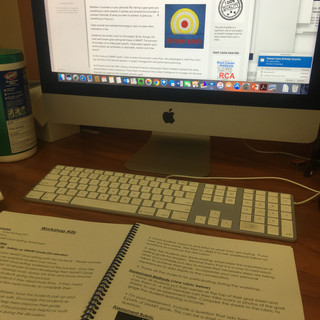Emerging Leaders Retreat - Goal Setting
- Cristina Dypiangco

- Oct 13, 2017
- 3 min read
Goal Setting Workshop
Learning domains: Education, Leadership, and Personal & Professional development
Description: On Friday, October 13th, I presented the Goal Setting workshop at the Student Life and Leadership Emerging Leaders Retreat. The Emerging Leaders Retreat is geared toward developing the leadership skills of emerging leaders through personal values, goal setting, and collaboration. I facilitated the Goal Setting workshop by discussing the importance of goals, the use of SMART goal setting, and how goal setting is connected to leadership. Participants completed an activity where they differentiated between goals that were vague and ones that were specific and provided suggestions on how to improve the vague goals. Students learned how to implement SMART goals and created SMART goals of their own. As the facilitator, I provided guidance on writing goals that incorporated each element of the SMART goal setting technique and allowed students to share their goals with a partner to receive valuable feedback. Lastly, I discussed how motivation and accountability impact goal achievement.
Term: Fall 2017
Learning Outcomes:
SWiBAT demonstrate appropriate preparation and planning for the workshop through elements such as visual aids, discussion questions, and assessment.
SWiBAT identify ways to improve their facilitation skills for future workshops.
Assessment Rubric:

Reflection
For SLO #1 would rate myself as advanced because I thoroughly planned for the SMART goals workshop by developing a facilitator's guide for the entire Emerging Leaders Retreat which included learning outcomes, materials, procedures, discussion/processing questions, and assessment in addition to a revised PowerPoint presentation. I also practiced my workshop beforehand with the community service project directors where I received valuable feedback. For example, students thought that the SMART acronym was too complicated, so I revised this section to be simpler. Additionally, students believed that a relevant example to exemplify each letter in the acronym would help them learn the material better, so I incorporated an example about school. Prior to the workshop, I spent one to two hours practicing my presentation and monitoring my timing. As a facilitator, I was able to read the audience and adapt to the situation. After I learned that many students had heard of SMART goals in the past, I knew that students had a general foundation of the material and were able to somewhat comfortably write SMART goals of their own. I was also able to encourage participants to share their perspectives.
For SLO#2 I would rate myself as advanced. I could have improved my facilitation skills in several ways. For example, I could have consulted Chickering and Gamson's (1987) seven principles for good practice in undergraduate education for advice about general facilitation models by developing a better connection among students (as cited in Quaye, 2017, p. 422). Additionally, rephrasing my questions could have encouraged students to be more upfront in sharing their experiences. For example, I could have asked “what are you questions” and “who would like to share an example” rather than “do you have questions” and “does anyone want to share.” I could have provided more content and experiences when asking how leadership connects to goal setting. However, this was balanced with having a enough time for the entire workshop. Next time I will ask students to discuss that section and the action plan part in groups. Additionally, in terms of classroom management, it was somewhat difficult to get the attention of a large group of about 40 students. In the future, once I have their attention in the beginning, I will let them know that when I raise my hand, I would like them to quiet down and refocus on the next topic allowing us to spend more time on the content. I will implement these changes at the following Emerging Leaders Retreat on October 27th. During the second Emerging Leaders Retreat I was more comfortable with the material and facilitating discussions. I made several changes that improved classroom management and encouraged more students to participate. Additionally, I had the cohort brainstorm ways to hold them accountable for their goals with the larger group so that students could learn from their peers. I established greater rapport with students by chatting with them in between breaks and providing individual guidance for their SMART goals.
Evidence
Please view Goal Setting PowerPoint below and reference pictures above.
- http://bit.ly/2j7QFGL
References
Quaye. S. J. (2017). Teaching and facilitation. In J. H. Schuh, S. R. Jones, &
V. Torres (Eds.). Student services: A handbook for the profession (6th ed., pp. 437-450). San Francisco, CA: Jossey-Bass.













Comments